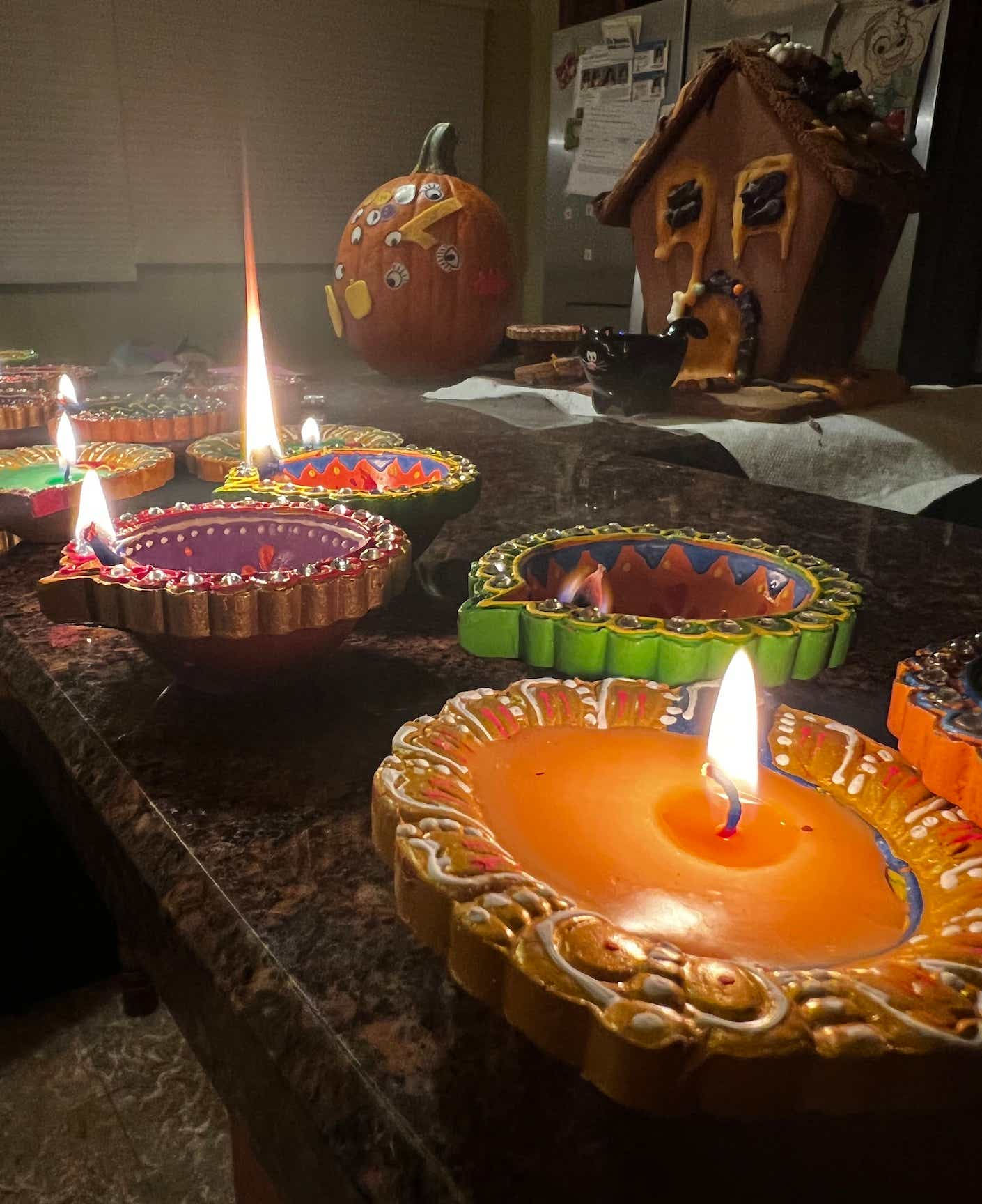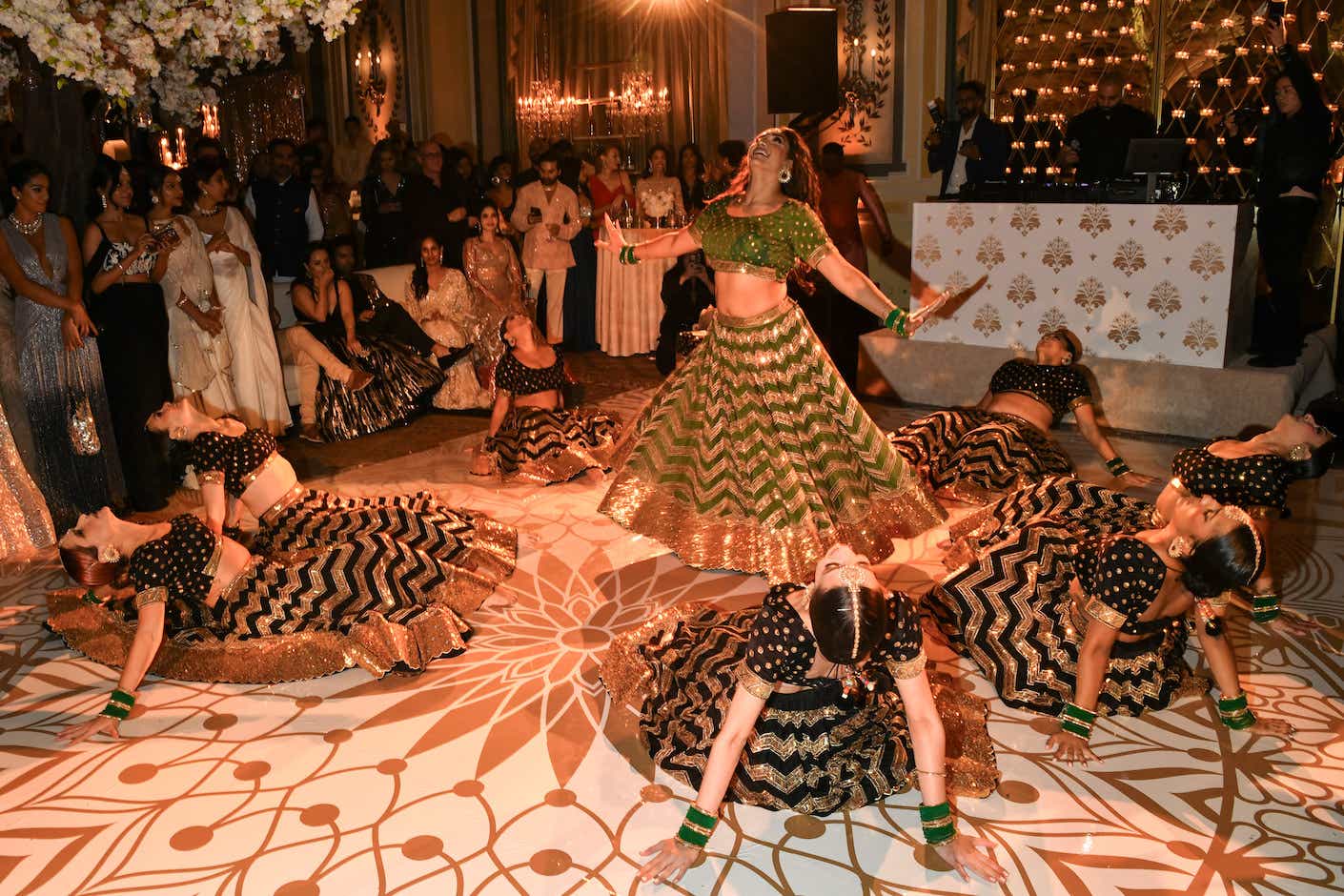When I was a little girl, one evening each fall, my mom brought out more than a dozen brown clay pots that were small enough to fit in the palm of my hand. She would melt clarified butter and carefully pour a small amount into each pot, then set one end of a fluffy white wick into the liquid. With her help, my two brothers and I would take turns striking matches, setting the wicks ablaze. We rested the lamps on small Corningware saucers and gave them to my dad, who placed one on our doorstep and in each room of the house. Then we spent time together and ate sweets until the flames in the little lamps winked out. Those evenings were quiet and cozy, and just one example of how Diwali is celebrated across a diverse diaspora.
Diwali, or Deepavali, is an important festival in Hinduism, Jainism, Sikhism, and Buddhism, also known as the festival of lights. The dates of the five-day festival depend on the lunar calendar, with Diwali usually falling in late October or early November. Many people celebrate on the fourth day of the festival, which marks the first day of the new year. While it holds a different meaning in each religion, the festival is essentially about the triumph of light over darkness. Those who observe Diwali might do so with prayer, sweets, or lights in the form of diyas (small oil lamps), candles, or even fireworks.

I teach my children about Hindu holidays like Diwali through books like this one, part of the “Celebrate the World” series. Last year, we made and decorated terracotta diyas. (Although our homemade creations didn’t hold up to the hot oil and flame well, it was the sentiment that mattered.) Each year, we dress up, light diyas in our home, then visit my parents so they can light diyas and share desserts with their grandchildren. My mom has told me stories of how she celebrated Diwali during her childhood in Guyana, a small country in South America with ties to the Indo-Caribbean culture. Her celebrations seem similar to the way we observe the holiday now, except she ate more sweets, like parsad, a soft fudge served at Hindu ceremonies, and kheer, a sweet rice pudding.
With more than 1 billion Hindus around the world, the holiday is celebrated widely, and now, is being embraced more than ever in the U.S. This year, Diwali became a state holiday in Pennsylvania. And for the first time, nearly 1 million New York City public school students will enjoy a day off this Friday because Diwali was declared a public school holiday. Many other school districts around the country also observe the holiday.
My local school district declared Diwali a holiday nearly eight years ago, around the time my oldest child was born. I had a hard time believing it at first since there had been no official mention of the holiday in school when I was little. Two years ago, the mother of one of my child’s classmates texted me to ask how we celebrate Diwali. She asked me for pictures, which she showed to her daughter. She wanted to teach her child about the significance of the holiday by embracing our culture. Last year, I organized a Diwali craft for my child’s class. We sent ceramic coasters etched with mandalas that the kids could paint or color in with markers, and the activity was a hit with my child’s classmates.
While it seemed like everyone I came into contact with either knew about the holiday or was willing to learn, the recognition seems to be growing at a quicker pace now.
I first noticed how pop culture has been playing a role in Diwali’s rise in popularity in American culture in 2006 on an episode of The Office. Written by Mindy Kaling, the episode showed the Dunder Mifflin crew celebrating Diwali with Kaling’s character, Kelly. It has been called a “masterclass in representation” for possibly exposing some of the show’s millions of viewers to the holiday for the first time. Nearly 20 years later, Diwali has gone mainstream in children’s shows, too. I remember when there was a Diwali episode of Mira, Royal Detective, in 2020. The show was a favorite in my house at the time and I was so surprised to see the characters celebrate Diwali that I immediately texted my mom. Diwali has also made it into many other children’s shows, including Sesame Street, Blippi Wonders, and Barney the Dinosaur.
Glamorous events that have popped up over the last decade or so are also helping Diwali become more widely known. There’s the 15-year-old All That Glitters Diwali ball, attended by Hollywood and Bollywood stars; the 9-year-old annual celebration in Times Square; and the White House Diwali reception, which George W. Bush started in 2003. In 2009, President Barack Obama lit a diya in the ceremonial East Room, becoming the first U.S. president to celebrate Diwali personally. He bowed before a Hindu priest, highlighting the festival’s emphasis on compassion and reflection. And it only continues to grow; according to news reports, this year’s White House Diwali reception was the largest ever, with 600 invitees. If VP Kamala Harris is elected president, it’s safe to assume she will bring her South Asian heritage into office with her. Meanwhile, her sister and niece, Maya and Meena Harris, have become known for their Diwali celebrations.

I also have to mention how many Diwali-related items you can find in stores now: I was delighted to spot a box of gorgeous diyas at Marshall’s last year, and Diwali greeting cards there this year. Big retailers are in on it, too: Target started selling Diwali decorations and party supplies a few years back. I noticed this year that Costco went big with literal gold bars stamped to mark Diwali. Mattel’s first-ever Diwali Barbie dropped on October 4 and quickly sold out. Luxury brands have gotten on board, too, with clothing, shoes, handbags, and more. In recent years, Jimmy Choo and Gucci released Diwali capsules, and Christian Louboutin came out with a Diwali edit this year.
This year, many people who observe Diwali will do so today, on Halloween. Some are celebrating both together in fun ways, like carving jack-o-lanterns that double as diyas. “Diwalloween” is sure to be trending on social media. Halloween, which is now more of a season than a single day, is much anticipated by my kids. So we’ll dress up and go trick-or-treating until our feet hurt. But after we get home, we’ll make our Diwali memories, lighting diyas and eating fun-sized candy as we watch the little flames flicker until they go out.









